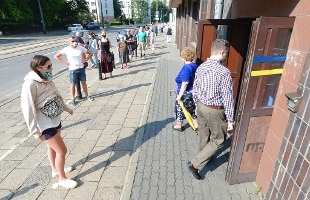- Outgoing President Duda stops at 43%. In Poland we go to the ballot
- Poland to vote. Lech Walesa: "The demons of populism and nationalism are lurking"
Share
July 12, 2020In Poland it is the day of the ballot to decide the new president. A vote that the European Union looks forward to, because the result could shift the country's positioning in Europe. There are two opposite ways of seeing Poland: that of the ultra-conservative president Andrzej Duda, ally of the Nationalist Party of Law and Justice (PiS), and that of the liberal candidate Rafal Trzaskowski, who declares himself the man of change. In the first round Duda got 43.7% and Warsaw Mayor Trzaskowski 30.3%.Duda President-in-Office
The incumbent President Duda, 48, is a training lawyer who won by surprise in 2015 representing the young and moderate face of the Law and Justice party, who had lost a series of elections under the party leader and candidate, Jaroslaw Kaczynski. He is a socially conservative Catholic who says he wants to defend the traditional family model. It supports the government's generous welfare program, symbolized by the 500+ program, whereby families receive 500 zlotys (110 euros) per month for each child up to the age of 18. Many Polish families have been relieved of poverty thanks to government policies and, for the first time since the end of communism in 1989, they feel that there is a party that cares about their needs. This is especially true in villages and small towns where Duda won in the first round two weeks ago. He has sworn to protect Polish families from what he calls an important "LGBT ideology" that aggressively tries to sexualize Polish children. Duda is also supported by American President Donald Trump, who congratulated himself on his "remarkable work", and visited the White House just before the election.
Who is Trzaskowski, challenger
Trzaskowski, also 48 years old, is a member of the center-right Polish Civic Platform party, which ruled Poland between 2007 and 2015, mostly under the leadership of Donald Tusk before were elected to lead the European Council. The mayor of Warsaw is in favor of the EU and has support in major Polish cities. In an interview with the BBC, he acknowledged that some members of the government in which he was minister were at times "somewhat condescending" towards the voters. It represents the most liberal wing of the party and, as mayor of Warsaw, participated in the LGBT equality marches and proposed to introduce classes in the schools of the capital to counter bullying against minorities. As president, Trzaskowski's power would mostly be limited to vetoing legislation, as any bill he presents could be rejected by the majority of government in Parliament. In an interview he claimed that Poland is still democratic, but its "democracy is under attack", as the government is politicizing independent institutions, such as the judiciary, and is trying to strip the local government of its powers. . As a former MEP, Trzaskowski says he wants Poland to take a more active role in EU negotiations. He fears that once the financial benefit from accession has been reduced, the dislike of the current government towards some aspects of the European project could eventually lead to Poland leaving it.

